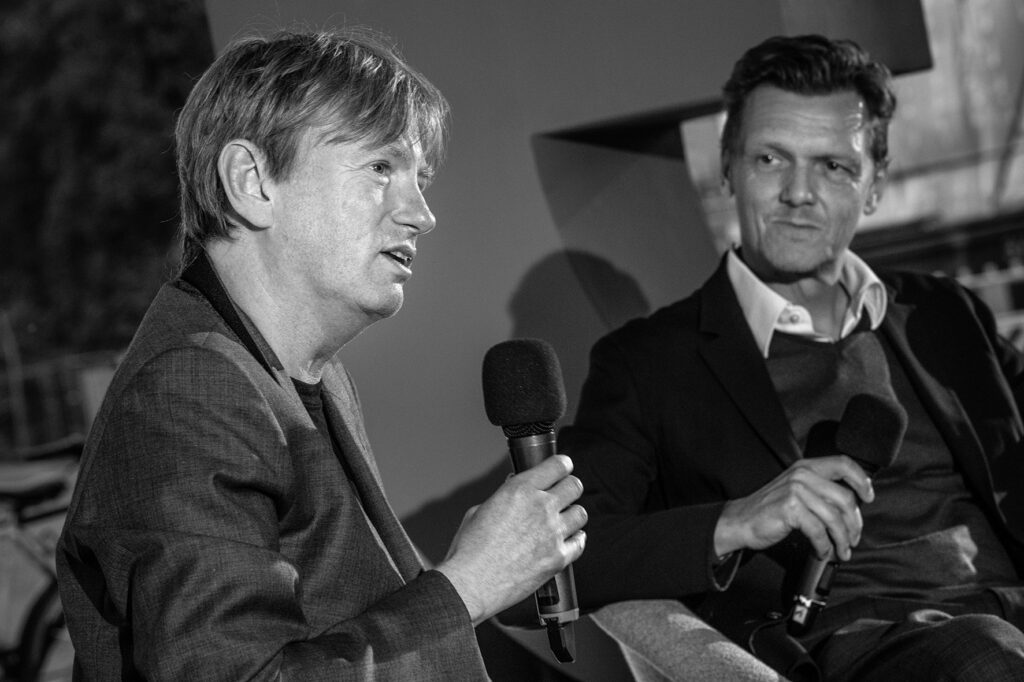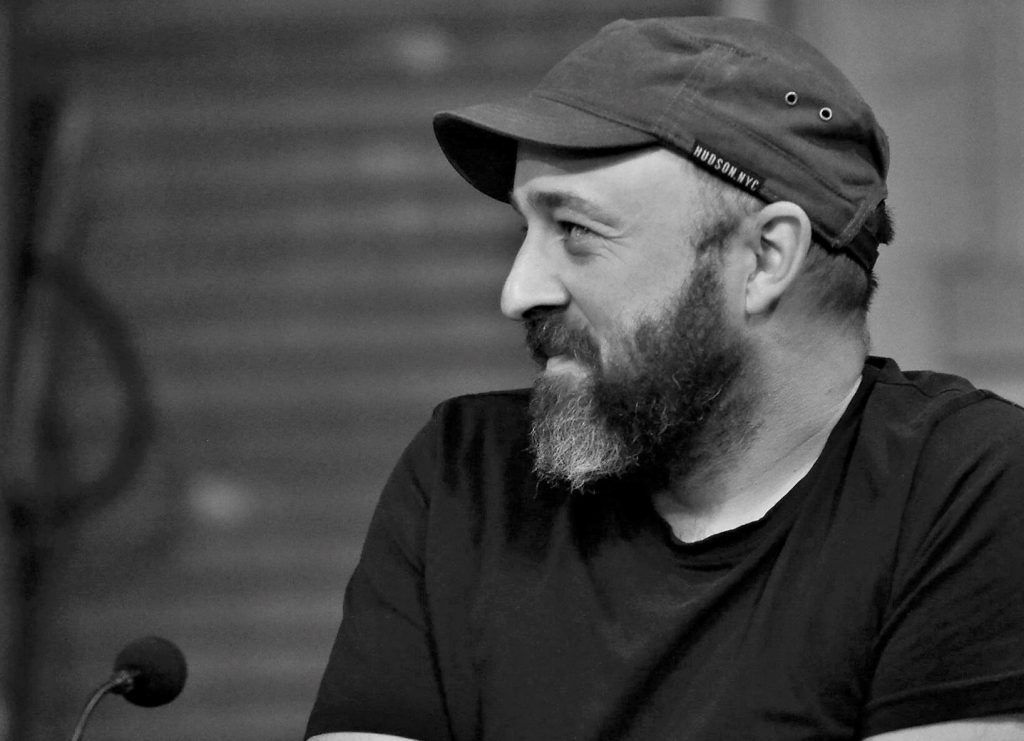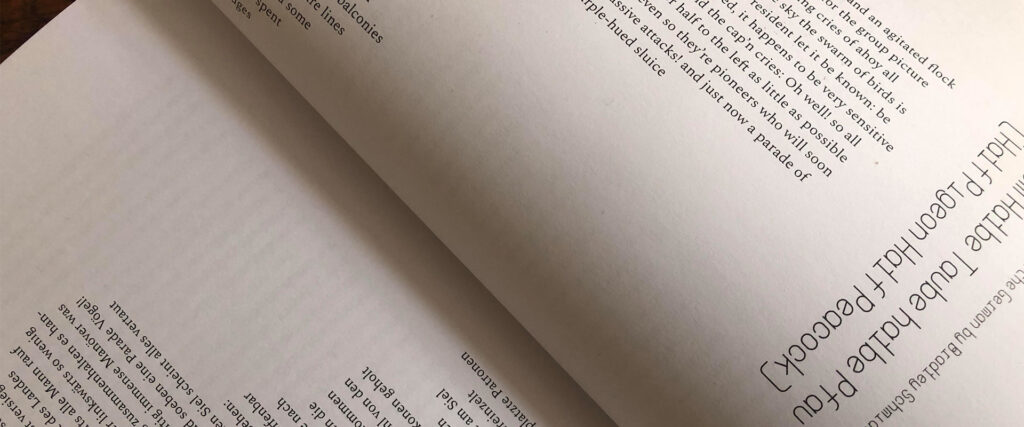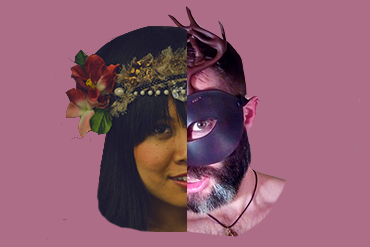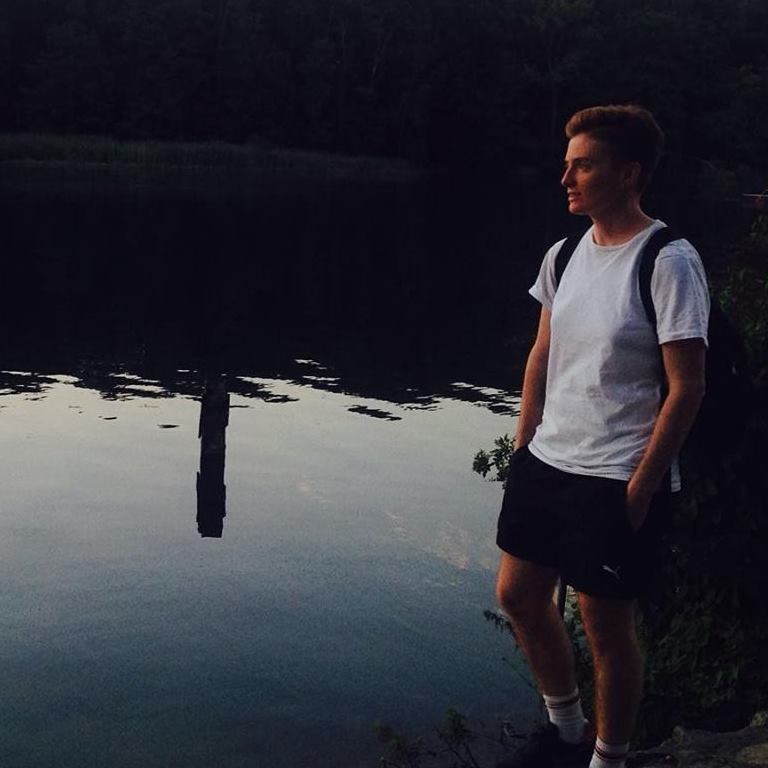During the 2019 internationales literaturfestival berlin, the celebrated Dutch-Australian-British novelist Michel Faber had a public conversation onstage at the Collegium Hungaricum with the German writer and dramatist Thomas Oberender. We are very pleased to feature a transcript of their conversation here, which, besides delving into Faber’s books and the migrations and tragedies of his life, explores one of SAND’s perpetual questions about the role of transnational – and even transplanetary – literature, from aliens to alienation.
(Spoiler alert: They talk a great deal about endings, though not in too much spoilery detail. Plot points are less of a sacred cow in the German literary world.)
PLANET FABER
A Conversation between Michael Faber and Thomas Oberender
20 September 2019 at the Collegium Hungaricum Berlin
Thomas Oberender: Michel, a warm welcome to the international literature festival berlin. It’s a great pleasure to have you here. Ulrich Schreiber, the Festival Director, is with us this evening and I know he is delighted to welcome you and to have the opportunity to discuss your books, each of which is so unique and fascinating.
Before we begin, I would like to introduce you to the audience. Michel was born in 1960 in Den Haag, Netherlands. At the age of seven, he moved to Australia with his parents and his brother. There, he studied English Language and Literature of the nineteenth century, which I think we see traces of in his later writing.
Michel Faber: I have to interrupt you there, because you mentioned that I emigrated to Australia with my brother. In fact, my brother was left behind in the Netherlands. This is one of the things that probably lies beneath all my writing: My parents were very fucked up by World War II. They decided to leave the past behind them, and the past included their children from previous marriages. So they left those children behind in the Netherlands and emigrated to Australia just with me.
Was it only your brother who was left behind in the Netherlands?
No, there was also a sister. I only met her for the first time when she was seventeen. I saw her again a few years ago and she is a nice lady, but I didn’t know her. I met my brother again when I was about thirty-four.
How did he manage his life?
He had a troubled youth. He did a lot of those things troubled young people do, but then he straightened out and got a job. He’s become a very fine human being, but still very damaged by the way our mother treated him. She is dead now.
How was it for you to move as a young boy to Australia with your parents and to live there with parts of your family?
I think the theme of alienation and encounter with a foreign culture is present in all my books. And of course, as a Dutch kid arriving in Australia, separated from my brother, I felt those jarring emotions. I would often ask my mother how my brother was doing and what he was up to. She would say, “Oh, it’s so long ago, he will have forgotten you.” And when you are a kid, you don’t question that kind of narrative. It was only when I was in my thirties, that I began thinking this didn’t add up and made contact with him again myself.
But it was strange growing up in Australia. I’m a very Northern Hemisphere creature, so growing up in a hot country was weird for me. When I was 33, I emigrated to Scotland and lived in the far north of Scotland in the Highlands, which is where Under the Skin is set. That was weird also in a different way. Now I live in England which is the fucking weirdest place I’ve ever lived in my life. The English really are very strange and they don’t think they are strange, which is strange in itself. I don’t have settled status, so I don’t know where I will live in the future. I’m Dutch. My passport is Dutch. After Brexit, all us Europeans will automatically be illegal aliens. We have to apply for permission to stay. That basically means me asking Boris Johnson or whoever is in power: Please can I stay in your country? But you know what? I don’t want to, it’s wrong, it’s just wrong. We will see what happens. If they get tough on those Europeans who have not applied, then maybe I will have to leave, and there will be another part of my life in another country. We’ll see.
Why the UK? You made a first attempt to become a British citizen in the 1980s?
Yes, I was married at the time to a woman who came from Winchester in England. She decided she wanted to go back home, so we saved up for a long time with the idea of emigrating to England. In the end, we must have been there about six weeks. She of course went back to her home town that she remembered from her childhood. But everything was different. She was taller and everything was wrong. So that didn’t work and we decided to go back to Australia. At the airport, I found out that I didn’t have the right stamp in my passport, so I wasn’t allowed to get on the plane. I spent a week homeless in London, until the next option opened up to fly. I’d spent all my money thinking I was going back to Australia, so I had to survive on the streets. I think a little of that in The Crimson Petal and the White, my novel about a nineteenth-century prostitute.
Is there perhaps a trace of this experience in The Book of Strange New Things, in the scene when Peter is returning to the station after a long period with the aliens? Somebody asks him to get into a car, and he realizes that he is dirty. He doesn’t dare sit down for fear of getting the seat dirty too. Was this also a memory of how it feels to have no home?
I think that making the choice to be homeless, while having a safety net in a week’s time, is completely different to being genuinely homeless. There is a reason why people are homeless. In fact, it’s usually many different reasons and they are to do with your life going down the toilet. My life didn’t go down the toilet; I just wasn’t allowed to get on the plane. That’s a completely different experience, but it’s still a glimpse into another world that you thought you wouldn’t be in, and then suddenly you are. It’s interesting for a writer, but I don’t imagine that I was ever really homeless.
When did you start writing?
I was writing books already as a kid. I wrote a book when I was about eight years old that was half English, half Dutch because I’d only just arrived in Australia.
Do you know what was it about?
It was called Knobble and Bobble go to the Moon. In Holland, there were these cartoon characters called Knobble and Bobble and the two mice. Later, I started a lot of novels in my early teenage years and I would read bits of them out at school at lunchtime. Some kids would come to to where we would eat lunch and I would read them the latest chapter of my books. One of them was like a cowboy novel. I knew nothing whatsoever about cowboys, so I just made it up. It had violence in it, which children like. Then I wrote a novel that was based on John Lennon and Yoko Ono. I wrote about a hundred pages of that and then that died. And I wrote about 120 pages of a science fiction novel, which was a typical novel that teenage boys write, where you wake up one morning and everyone in the world is dead except you and you’ve got the whole world to yourself, that kind of thing.
Every year, as I got older, I would read back what I’d written the year before and realize it was shit. And then I would start again and write a new version. By the time I’d written that, I would be a year older and I would realize that it was also shit. And this went on and on. Having started and failed to finish about five novels, I then got married to this Englishwoman, who also wanted to be a novelist. She was writing an autobiographical novel, a sort of “portrait of the artist as a young woman” novel. She got terribly stuck with that. About halfway through, she didn’t know what to do with it. And because of my failed attempts to write a novel and her failed attempts to write a novel, I thought there must be a better way to write a book than this. I figured maybe I need structure, planning. So I thought about who was good at planning books, and decided the Victorians were very good at the architecture of novels. I read Middlemarch by George Elliot, which is a beautifully constructed novel, and I thought this is it: Before you start you just plan what the book is going to be. So, with The Crimson Petal and the White, I knew everything that was going to happen in every chapter, virtually every scene.
I can imagine it’s a complex structure.
I had about two pages of planning and then I wrote the book – and it worked.
But it took you twenty years?!
Well…I didn’t spend all those twenty years writing The Crimson Petal and the White. I also had a marriage which was dramatic, and I worked as a nurse for many years. Also, my big passion is music and I spent about ten hours a day listening to music. So I didn’t write very much for a number of years. When my first marriage fell apart, I had more time and I got back to the book and finished it quite quickly.
The original version of the book had a very bad ending; the heroine, Sugar, came to an awful end. And when my second wife Eva read it, she said “You can’t do this to this girl, people love her, they have been through 800 pages with her, you cannot kill her in this horrible manner.” And I said “No, you don’t understand tragedy.” And she said: “I do understand tragedy, I just don’t think you should do that in this book.” So then I wrote a different version of The Crimson Petal and the White, in which she survives.
It’s a very special ending. The heroine leaves the story and nobody knows her future. Except you, maybe?
I don’t know actually. To me, that felt appropriate. Eva once advised me to give Sugar free will and let her be a human being instead of a puppet in a Greek tragedy. Throughout the novel, we have seen everything about her, including her sex life. We have full access to her life. It felt right at the end that she should have her privacy, that she just goes into her own future, and we don’t know what that is.
I worked very hard on that final chapter. But some people are not very happy with it. I get lots of letters of disappointment saying “you cannot do this, where did she go?” – particularly from American readers; Americans really want things tied up.
There’s also a very short, special chapter after the heroine, Sugar, has left the story into this unknown future. And it’s when the book itself speaks to us and says farewell. We understand then that the book was our mistress, a living being that has many sides, many contradictions, its own time, its own dignity. For me, this was the greatest shift in voice since Dostoevsky’s Crime and Punishment.
I’m glad that you are happy with that farewell. There is certainly this element of the book saying to the reader: Come with me, I’m going to show you the best time of your life. The question is whether the book will deliver on that promise. While you are reading the book, it has this grip on you. But when the book is over, the relationship is over. I’ve never gone to prostitutes, but I think it’s an encounter that has that kind of fulfilled or broken promise.
I think often with serious literature, there is a promise made which is not delivered. If the writer is really serious and literary, they feel it’s okay not to give thrills or emotional engagement because you can get that stuff from bestseller books, from some crappy airport writer. There’s this assumption that you come to the prize-winning literary author for something higher. I never respected that distinction. I feel that if someone is going to give time to a book, then they should care about its characters. They should be turning the pages and worrying if the protagonist is going to be all right. They should be getting angry, they should be stressed – all those things that you get from a romance or a thriller. It should all be there. There shouldn’t be this division between high and low literature.
Thinking about endings, The Book of Strange New Things has a very tough conclusion for me, but one can see it from different perspectives. Perhaps you can elaborate a little on that book and its ending?
For me, The Book of Strange New Things was the final book I was going to write. I had this sense that I only had a certain number of novels in me and this was going to be the last. It is an immensely sad book about a Christian minister who gets the job of ministering the spiritual needs of the native population of an alien planet called Oasis. There is a shadowy multinational cooperation that has a base on the same planet and they are somewhat liaising with the native population. The one thing that the aliens want is the word of God and a Christian minister. They had one before but he has disappeared, so they want another one. So Peter gets this job and goes to Oasis. His wife is left behind on earth and they correspond. The novel looks at what happens to that relationship between two people who love each other but are now separated by an immense distance. Peter is doing his job on Oasis: it’s actually a wonderful job because the aliens want nothing more than the word of God. His wife, meanwhile, is here on Earth and everything is falling apart: all the climate change and societal breakdown that we are already seeing. She is trying to communicate this with him but he is up there and she is down here; there is a tension between their different realities.
Shortly after I started writing this book, my wife Eva was diagnosed with incurable cancer. We knew that she was going to die within a few years. That added another dimension to the book. I don’t know how many people here have had this experience, but when the person you love has cancer and you don’t, they really are on a different planet; they are on planet cancer. And you can love them, you can support them, but you can’t really be with them. So that all fit into the book. Saying goodbye to all the things the book says goodbye to was also saying goodbye to Eva. And she helped me with that book a lot. She helped me to edit it and to finish it. She knew that it would be published, but she didn’t live long enough to see it published. It’s a goodbye book. I thought that it would be my last novel. I still think that it will be my last novel for adults, but I have since that time written a short novel for children, coming out in 2020.
Was Eva also a writer?
Yes, she was also a writer. Do you have this saying in Germany that to get really good at something you need to do it for 10,000 hours? Well, she didn’t do it for 10,000 hours. She was also a mother and a teacher. There were a lot of things in her stories that she hadn’t worked out. But she had a very interesting way of seeing the world and she wrote about interesting subject matters. As a child, she was a Jehovah’s Witness. Her parents were from Poland, but they were Polish-German. This meant they were on the Nazi Volksliste, which determined who had German blood, and who would get a better deal. Basically, if you had any German blood, you got more calories – that’s what it boiled down to. After the war ended, these German Poles who had received favorable treatment were in big trouble. So Eva’s parents emigrated to Australia, where she grew up, but with this whole World War II cloud and German-Polish Jehovah’s Witness complex hanging over her . She wrote about all that in a very interesting way, but most of her stories are not finished. What I want to do is to finish her stories. I’ve done four so far. I’ve shown them to some other writers, and what delights me about their response is that they notice this distinct sensibility which is not mine, and which is consistent in all four stories. I’m very happy about that, because one of the stories is about 99% her prose – I just made a few editorial adjustments. Another one is maybe 60% her prose and 40% mine, and another story maybe 40% her, and 60% me. The forth story is almost all my prose and just her ideas and sketches, but it’s her voice in each of the four and I’m hoping that I can achieve that with the other stories as well. Then there will be a book by Michel and Eva Faber.
In The Book of Strange New Things, Peter returns back to Earth and his wife, but the planet is in a state of catastrophe. He learns that he will be father and at the same time, the world is disappearing.
We are living in a very scary world. Just look at the climate protest we had in Berlin today. We are living in a world where parents cannot do that thing that parents have always been able to do for their children: to say everything is going to be all right. We’ve got a civilized world full of parents who are terrified because they know it’s not going to be all right, but they still have to bring up their children. It’s an impossible human ritual.
The Book of Strange New Things is trying to look at that dilemma and be honest about it, but without leaving the reader depressed. It’s a very difficult challenge. You can write a book that brings everyone down and says there is no hope. It’s easy to write such a book because we have so much supporting material, but that doesn’t help anyone spiritually. I think one of the things that literature should do for people is give them the strength to carry on. With The Book of Strange New Things, I’m trying to find a way to confront all that real stuff while still having some consolation.
One of the things my wife did before she died was to help me to write a different ending for the book. The original ending had Peter, our hero, in the exercise yard of this alien compound. He knows that he is going to go back to Earth and trying to find his wife. BJ, one of the other characters, says to him: “Look after yourself, be careful, it’s a dangerous place down there.” And he says: “Scout’s honor!” That was the end of the book.
I thought this was so clever because Peter used to be a Boy Scout, and the “Scout’s honor” sign is this three-fingered gesture, like the shape of a Gothic church, and the Trinity of Father, Son, and Holy Ghost. I thought this was great, but Eva said “It’s just clever, it doesn’t have emotional punch. After a book that’s got so much emotion in it, you can’t end it like that.” She said: “No, go back and write an ending that has emotional resonance.” So then I went back and wrote what you have described.
Peter is thirty-three years old, by the way, the same age as Jesus at his death. Why is that? Is it by accident?
Of course it is not by accident! Nothing in my books is by accident. But I wanted it to look like it’s an accident. There’s a lot of religious stuff in all my books. If you dig beneath the surface, you can find many levels of reference and meaning: mythology, the bible, and so forth. But I make sure that nothing gets in the way of the reader’s enjoyment. This differentiates my work from the work of a lot of serious authors, where you often have this sense that unless you put in all the research and understand all the references, you can’t go on with the book. I try to do it differently in my books. With The Book of Strange New Things, if you want to see it as a story about two people who love each other and are losing touch with each other, you can read it on that level and keep turning the pages. Likewise, with Under the Skin, there’s this sci-fi thriller backbone to the narrative, and if you want to go purely on that journey as a reader, you can. But if you want to read it again and see more layers, you can. If you don’t want to read it again and never see the layers, that’s fine, but they are also there if you want to discover them.
In your first novel, the aliens speak about humans as aliens on earth. For them, we are just an animal species. Could you talk a little about this framework of dehumanization and othering?
All my books are about alienation of one kind or another. Often, the way people give themselves permission to treat other people badly is by defining them as Other. That’s how we get into gender issues, race issues, war. It is this notion that the other person is a different kind of life form and therefore, you can do whatever you like to them because they are not like you, they don’t suffer like you, they are not important like you. I’m looking at that from one perspective in Under the Skin and from a different perspective in The Crimson Petal and the White, because the protagonist is a prostitute and from a lower class, so she is treated as a completely different kind of creature.
For me, it’s also important how you create a distinct language for the alien beings in The Book of Strange New Things, so they have their own kind of pronunciation and expression. And you actually use special typography to designate this special way of speaking, as well.
In my original manuscript, I had Thai letters which looked really beautiful. But I have to accept that there are a few people in the world who speak Thai. So my publisher designed a new language which looks a bit Arabic, and a bit Hebrew, which is appropriate for The Book of Strange New Things.
You also play with the lettering in different books: font sizes and effects.
I’m a huge comics fan and in all the Marvel comics that I read when I was a kid, all that stuff was happening and I thought: Well, why not use that in literature.
You use another thing from comics: names. Can you tell us a little about that?
All the human characters in The Book of Strange New Things have names based on the surnames of writers and artists from Marvel Comics from the 1960s and 70s. I love all that stuff and it is my way of saying “Thank you and Hello”. For example, Kurtzberg who was the Christian minister who went to the planet before Peter, is based on Jacob Kurtzberg, aka Jack Kirby, one of the great comic creators. He invented the Fantastic Four, the Hulk and all those characters. A lot of the names I chose are the names of inkers; Marvel Comics had a sort of production line where one person would draw the comic in pencil, and then it would get passed on to someone else who would do the inks. One of the inkers was called John Severin. He was very talented and had a very special style on his own. I borrowed his name for one of the characters in The Book of Strange New Things, a man that Peter meets on his journey to the planet.
You have said that you never saw writing as a career. How did you see writing?
For me, writing was claiming the right to be in a certain spiritual state unaffected by other things. I got the same thrill from listenting to music. I wanted to use what I did in that space in a way that could be useful to other people. I didn’t want to be self-indulgent.
I think it worked!
Question from the audience: One thing that confused me in The Book of Strange New Things is the conception of the aliens. I still found them very human; they are all individuals and can communicate with each other. Did you ever think of making them completely different?
If I had made the aliens in the shape of a container, making sounds that we could not understand, that would have given the message that is is impossible to cross the divide between us and the other. I don’t think it’s impossible, I just think that it’s fucking difficult. And it needed to be difficult, and the reader needed to be reminded that when we think that we understood other people, we probably haven’t. But I did want there to be a sense that understanding could happen, so I made the aliens just human enough for that to seem possible. There is a bit in the book – for those of you who haven’t read it – where Peter first encounters the aliens. They are human in shape, with two legs and two arms, and he thinks this is weird because you would expect them to be giant spiders or something. And then they pull back the hood from their faces and there is nothing in there that looks like a face. He doesn’t know what he is supposed to look at. He doesn’t know where the noises are coming from. That’s a reminder of their alienness without taking it so far that it becomes conceptually impossible for him to relate to them at all.
Thomas Oberender: Under the Skin is another example of alienation through the body.
One of the things that fed into the creation of that book was the rapid surge in cosmetic surgery. Among women, it started to be very common to say: “I’m gonna have my face or my breasts done. And it’s not that I want to be beautiful, I just want to be normal. I always knew that I wasn’t normal and that this was a problem that needed to be fixed.” I was a nurse for nine years and I know what surgery is. The idea that someone would allow themselves to be willfully mutilated to be considered normal was so bizarre to me. This made me think: What would it be like if someone needed to be surgically adjusted in order to pass for a human? This is what Isserley in Under the Skin has done in order to convince human beings that she is a human. There is gender politics in there, there are body issues, and once again the alien and the other – those same themes that come up in my books over and over again, just seen differently.
Question from the audience: What do you think of the movie adaption of Under the Skin?
I thought it was a terrific film. It’s very different from the book, which is exactly what I wanted. If a movie tries to be the book, it’s always going to be inferior because when you read a book, you make the movie in your head, and that movie is always better than any movie that someone else can come up with. So the only way to make a good movie from a book is to take some of the ideas and do something very different with them. This is something Francis Ford Coppola did with Heart of Darkness by Joseph Conrad, turning it into this Apocalypse Now war movie which is of course extremely different from Conrad’s nineteenth-century novel. I think something similar was achieved with Jonathan Glazer’s Under the Skin. It’s a film I have seen five or six times now, because I have introduced it at film festivals. Every time I see it, I admire it more. I think it is an extraordinary work.
A lot of films give you all the information and tell you the context. This film captures an alien [who is] supposed to be making her way in this world, trying to figure out how to communicate with these men that she is trying to pick up. And that confusion is in the film; it’s a very puzzling movie, but it’s very strong. If you want to grapple with it more, you can watch it again. Or you can say to your friends: I don’t know what the fuck this was all about; I’m never watching another film by that director. That’s okay as well, but the movie doesn’t compromise and I admire it for that.


